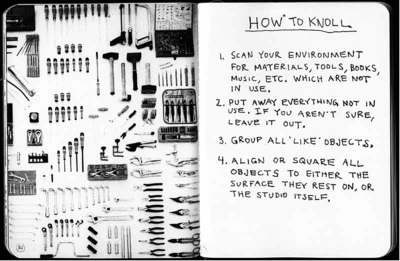This series of blog posts about KNOLLING is dedicated to Andrew Kromelow who coined the term ‘knolling’ in 1987 and to Tom Sachs who expanded on the concept of knolling to ‘Always Be Knolling’.
I first heard the term ‘knolling’ around a month ago. I was fascinated by the term and started to research everything I could about it. I became somewhat confused because I could not discern if it was a systematic method of organization or an artistic technique also called flat lay photography or flatlays.
It seems to have started as the former and morphed into the latter over time. ‘Flatlays’ or ‘flat lay photography’ has nothing to do with knolling as a systematic method of organization. But from the way I understand these terms, they can be used as a record of knolling a set of objects. It can also be an art form of pleasantly laid out objects. It is presently and widely used on Instagram, tumblr and Pinterest. The purpose of using these social media applications is a popular means of graphic design layout or brand marketing as shown below. Instagram photos used in an article on Business Insider called, Everyone’s obsessed with ‘knolling’ their stuff and putting the photos on Instagram
I have written three previous blog posts about knolling to get as clear an understanding of it as possible. These blog posts represent my process with this goal in mind.
• KNOLLING: Organizational or Graphic Design Layout and Product Branding System?
• KNOLLING: Can It Help Organize My Costume Jewelry Collection?
• KNOLLING: Social Media Gives Knolling New Meaning
The focus of this fourth blog post is to analyse the original process of ‘knolling’ used as an organizational tool. Specifically, it is about the process which I believe that Andrew Kromelow used to ‘bring order out of chaos’ in Frank Gehry‘s furniture fabrication factory where Kromelow worked. That resulting order prepared the staff for the continuation of a project or the starting of a new project.
I am finding that knolling is also a catalyst for creativity. This is my experience and what I would like to share. Just to clarify, the following video is not what I am writing about. My focus is not on flatlays or flat lay photography. But for information sake, this video, Making a Flat Lay Collage for a Campaign, Brochure or Magazine from StyleShoots by Matt Brasier, explains those terms and their current use.
The following video, Ten Bullets by Tom Sachs, does focus on knolling in great detail.
In my second blog post, I asked the question, KNOLLING: Can It Help Organize My Costume Jewelry Collection? In a word, YES. It can and it is helping a great deal. I am in the process of creating four boards so far:
• a board for my bracelets that holds 48 bracelets laid out in color order as an additional organizational system
• a board for about 2 dozen necklaces, again using color order as an additional organizational system
• a board for earrings
• a board for pins
I am also working on layouts for my hat collection and my purse collection.

The next things that happened was a spontaneous inspiration. Once I had created order out of chaos and could see my things neatly laid out in front of me, I experienced an epiphany. I felt the desire to commence making jewelry. I am not ever sure what the thought process was or if there even was one. I do have lots of broken pieces of jewelry which I hoped to repair some day. I also have a new piece that was missing some stones that needed regluing. The next thing I knew, I had retrieved my jewelry storage boxes from my shelves. I got out my glue and I started creating. I have already created two pieces of jewelry out of one piece and have plans for quite a few other pieces.















